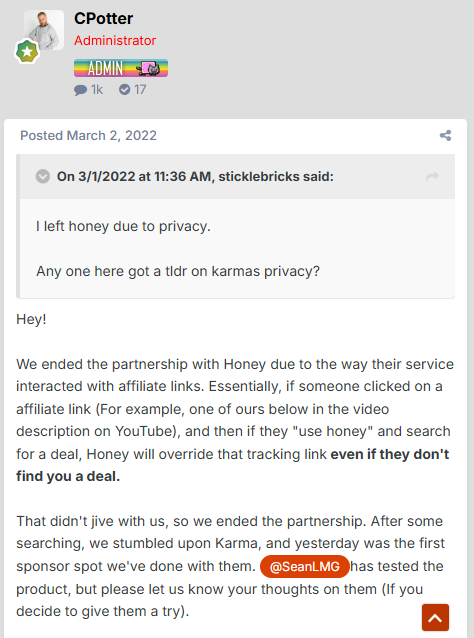I KNEW IT!!! https://t.co/MGme4rJ7wo
— Mark (@markiplier) December 23, 2024
The internet’s favorite deal-finder, Honey, is suddenly facing a massive buzzkill. In a swift and sharp downturn, the PayPal-owned browser extension has reportedly lost over 3 million users in the wake of an explosive exposé by YouTuber MegaLag. The video, which has since garnered over 13 million views, accuses Honey of shady affiliate practices and shortchanging both shoppers and creators.
MegaLag argued that Honey overrides affiliate links at checkout, effectively stealing the credit (and the commission) from creators who promoted products. But Honey isn’t rolling over just yet. In response to the outcry, the company has leaned on a term many might not know but are now scrambling to Google: “last-click attribution.”
What is last-click attribution, and why does it matter?
In a statement to Newsweek, Honey defended itself, stating that it follows “industry rules and practices, including last-click attribution.” This system gives credit for a sale to the last touchpoint a consumer interacted with before completing a purchase. Honey, in this case, argues that since its extension is the last interaction before the transaction, it’s entitled to the commission.
Critics, however, see things differently. “PayPal didn’t refer the customer to the store. They didn’t promote any of the products. The influencer did that,” MegaLag argued in his viral video, which has amassed over 13 million views. “PayPal provided absolutely zero value to the customer, yet they were rewarded for the sale.”
By replacing affiliate links with its own tracking, Honey is accused of not just taking the commission that influencers rely on but also creating a broken trust loop. It’s like a middleman swiping the tip off a restaurant table — unseen, unnoticed, and infuriating.
Influencers sound off
The controversy has unleashed a torrent of backlash from creators. Austin Evans, a tech YouTuber with over 5.6 million subscribers, minced no words in his response: “It is completely unacceptable that Honey is acting in this sort of way. I will, under no circumstances, work with Honey ever again.”
Hank Green, another prominent creator, took it a step further, highlighting systemic issues in influencer marketing. “The big bad guy in this story is Honey,” he said in a December 24 video. “The second big bad guy is PayPal, who was like, ‘Yeah, that is a great business model! We love that and we’re going to make you billionaires for creating it.’”
Even long-time critics of the extension are weighing in. Markiplier, known for his 37.2 million YouTube subscribers and straight-shooting opinions, took to X to declare: “I KNEW IT!!!”
The fallout has also rekindled past grievances. Linus Media Group ended their partnership with Honey back in 2022 due to concerns about how the extension interacted with affiliate links. “Essentially, if someone clicked on an affiliate link, and then used Honey to search for a deal, Honey would override that tracking link even if they don’t find you a deal,” the group stated.

Adding fuel to the fire, MKBHD, one of YouTube’s most prominent tech reviewers, has removed Honey promotions from his content. He confirmed this in a video after MegaLag’s went viral, which speaks volumes about the growing unease among creators.
Legal action: Enter LegalEagle
Adding a dramatic twist to the saga, YouTubers and influencers have filed a class-action lawsuit against Honey, accusing the company of stealing billions of dollars from creators. Inspired by MegaLag’s exposé, LegalEagle claims that Honey’s affiliate practices have harmed thousands of creators and businesses.
“Think about how insidious this all was,” he stated. “Honey allegedly seeded audiences with their extension, and that extension probably stayed on their audience’s browsers like a sleeping leech, waiting for the viewer to conduct a transaction.”
LegalEagle argues that Honey’s actions have devalued creators’ sponsorships and affiliate relationships, sniping commissions from creators who worked to drive their audiences toward products. The lawsuit seeks damages for affected creators and an injunction to prevent Honey from continuing these practices.
“I’m honestly surprised that extensions like Honey are even allowed on marketplaces,” LegalEagle added. “It’s time to put my money where my mouth is.” He has also launched a website to invite other creators and businesses to join the class-action suit.
Beyond the influencers, MegaLag’s investigation raises a broader question for shoppers. Are we sacrificing real savings for the illusion of convenience? According to the YouTuber, Honey often prioritizes discount codes that benefit their business partners, sometimes at the expense of better deals for users.
For shoppers, the lesson is clear: don’t rely blindly on one tool for savings. And for creators, it’s a stark reminder to scrutinize partnerships carefully. Hank Green summed it up best: “The small business ecosystem of creators has been set up for exploitation. And that, I feel like, is ripe for change.”
What’s next for Honey?
With part two of MegaLag’s exposé promised to reveal even darker secrets, Honey’s woes are far from over. While the company insists it’s playing by the industry rules, the court of public opinion isn’t so sure. And as creators like MKBHD quietly scrub Honey promotions from their content, it’s clear that trust — once lost — is hard to earn back.
Indeed, the allure of easy savings may be tempting, but transparency and trust are priceless.
TechIssuesToday primarily focuses on publishing 'breaking' or 'exclusive' tech news. This means, we are usually the first news website on the whole Internet to highlight the topics we cover daily. So far, our stories have been picked up by many mainstream technology publications like The Verge, Macrumors, Forbes, etc. To know more, head here.


